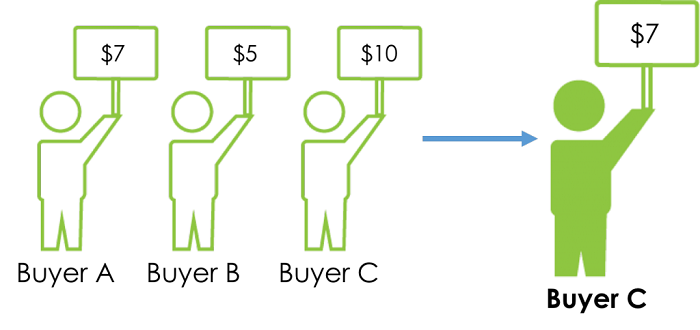Bidding Strategies in Auctions

If you’re bidding at an auction with a fixed end time, try “auction sniping.” Wait until the last minute to place your bid. This can be challenging because of internet lag and the fact that displayed clocks may be off.
Some people also dress appropriately so that other buyers know they mean business. This can discourage other buyers from making a higher offer.
Marathon bidding
When you’re bidding at a car auction, there are some strategies you can use to improve your chances of winning. The first is to be consistent and confident. This will signal to other bidders that you’re serious about winning. When a rival bidder comes in, quickly counter their offer. This will discourage them from continuing to make offers that are too high for your budget. Moreover, you should always be aware of your maximum bid amount and stick to it. This is especially important if you’re bidding over the phone. It’s also helpful to go with a partner who can keep you in check and prevent you from going over your limit.
Another strategy is to start low and increase your bid gradually. This will allow you to control the pace of the auction and avoid getting caught up in a bidding war. It’s also a good idea to read the lot description carefully, as this can give you clues about the value of the item.
You can also bid absentee, a great option if you’re not at the auction. Most online auctions will let you enter a maximum bid and then automatically place small increments of bids on your behalf. This way, you can focus on other auctions while still keeping an eye on the items you want to win.
In addition to using a consistent bid strategy, staying in control of your emotions is important. If you’re feeling nervous or emotional, this may show in your body language and can cause other bidders to misinterpret your intentions. This can lead to a bidding war that will put you over your budget.
It’s also a good idea to arrive at the auction early. This will help you find the best place to position yourself and determine how many other bidders are there. You should also stay away from conversations with other bidders to avoid giving away information about your strategy. For example, if you’re talking to a competitor about your plans for renovating the property after the sale, they might increase their ceiling price in anticipation of your response.
Absentee bidding
If you’re unable to attend an auction in person, it’s possible to place absentee bids. However, it’s important to understand the process before submitting your bid. This can be a great way to avoid being outbid by someone with a larger budget. In addition, this method may allow you to purchase an exceptional item for a lower price. Before bidding, read the auction terms and conditions carefully and make sure that you know what fees will be charged (buyer’s premium, taxes, shipping, etc.). Moreover, be punctual and speak clearly when placing an absentee bid. Otherwise, you could aggravate the auction crew and attendees and be treated unfairly.
One strategy for placing an absentee bid is to start with a low amount and then gradually increase it. This strategy is also known as “sniping.” Another strategy is to wait until the end of the auction to place your bid. This is a risky strategy and can backfire, especially if other people have the same idea.
If you are a novice at auctions, learning some basic tips and tricks is important to improve your chances of winning the bidding war. First, you should research the property and know how much it is worth in your market. Also, be aware of any special terms and conditions the seller might have. This will help you set a ceiling price for your bid and keep you from spending too much money.
A successful auction bidder is able to identify the auctioneer’s cues. For example, if the auctioneer appears nervous or emotional, it can indicate that there is an aggressive bidder in the room. A skilled auctioneer can use these cues to his or her advantage and manipulate the bidding process.
Within the auction industry, absentee bids are generally seen as a ministerial accommodation to buyers who cannot be present at an auction. However, it’s critical for an auctioneer to determine up front how absentee bids will be executed and make that clear to both absentee and live bidders alike. This policy should be stated in the Bidder Terms and Conditions and the absentee bid form signed by the bidder to avoid confusion.
Bid nibbling
One of the most common bidding strategies in auctions is bid nibbling. This involves placing small bids early in the auction to increase your chances of winning. This strategy works well for both in-person and online auctions. However, you should be careful to place a bid that is within your budget. If you are too low, you could end up in a bidding war with other buyers who may not be as cautious as you.
Many people hesitate to use bid nibbling because it can be frustrating if others outbid you at the last minute. The best way to avoid this is to make bids at the auction’s beginning or when you add them to your watch list. Once the item is on your watch list, you can monitor it closely. Depending on the item, you can then increase your bid incrementally. This is a great strategy for auctions with a reserve, as it gives you an opportunity to win the auction with a small increment.
Nibbling is also a good strategy for online auctions, as it allows you to track the price and keep up with other bidders. Some people even use proxy bidding, which allows them to place bids without revealing their identity. This allows you to avoid being outbid by people with different interests and backgrounds.
Another important tip is to avoid letting other bidders know when you are nearing your maximum purchase amount. If you let them know that the end is near, they will keep increasing their bids in hopes of outbidding you. This can lead to a long, drawn-out battle you do not want. Instead, try to leave a few seconds between each bid.
Some people also like waiting until the auction is almost over before bidding. This strategy is known as “sniping.” The idea is to check back right before the auction ends and outbid everyone immediately. Be sure to check the policy on the auction before attempting this strategy, as some sellers will extend the sale if there are higher bids in the last few minutes.
Waiting until the bidding is almost done
In auctions where there are many bidders, one way to avoid the winner’s curse is to make small, consistent bids. This will show that you’re serious about winning the item, which may discourage other bidders from raising their prices. If you’re willing to wait until the bidding is almost done, this strategy will help you win the item for a reasonable price.
However, there are some things to keep in mind before you use this bidding strategy. First, don’t reveal too much information about yourself to other bidders. This could give them clues about how badly you want the item and allow them to figure out your maximum bid before the auction ends. Making your bids as early as possible is also a good idea. This will prevent other bidders from using the proxy bidding system to place bids on your behalf.
Another important factor is to be aware of the psychology of other bidders. Emotional or nervous bidders can be intimidating and can scare off other buyers from placing a high bid. You can avoid this by staying calm and remaining silent or by using a different bidding strategy.
When you’re bidding in an online auction, it can be difficult to determine how many other people are bidding on the item. This is because the countdown clock often fluctuates due to network connections and lag. When this happens, you can miss the ending time of the auction. This can be frustrating if you’re a buyer who wants to get the best deal.
To avoid this problem, you can avoid auctions where the seller has a reserve price or other restrictions on bidding. Instead, consider asking the seller to take offers. This option may save you time and money, especially if the item is a popular item or has a low reserve price. It also may save you from competing with multiple bidders trying to outbid each other.



